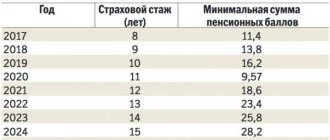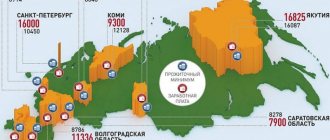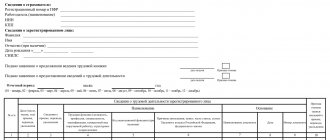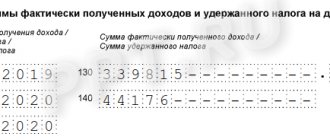Indexation from January 1, 2020
The first indexation of insurance pensions will take place on January 1, 2019. The indexation coefficient is the same for all – 7.5 percent. Through this indexation, the authorities want to achieve an increase in pensions by 1,000 rubles per month.
You can independently multiply the size of your pension by 1.0705 and determine what payment you will receive from January 1, 2019.
Also see “ An increase of 1000 rubles in 2020: who is entitled to it .”
However, there is an important point - the January indexation will not affect working pensioners. Some will continue to receive pensions at the same rate.
Increase amount
Based on the law on the Pension Fund budget for 2020, social pension provision was planned to be increased by 7%. However, according to the latest calculations, the indexation percentage will be 6.1%, and the amount of the final payment will vary depending on the pension issued.
According to information from the Ministry of Labor, calculations were made, as a result of which the indexation percentage adjusted downward was established.
Interesting!
After indexation, the average social pension at the end of 2020 will be 9 thousand 925 rubles. This figure in 2020 was 9 thousand 266 rubles.
Indexation table for 2020
Below is a table with coefficients and indexation dates for 2019.
| What is being raised? | Indexation date | Coefficient |
| Insurance pensions (cost of 1 IPC and fixed payment) | 01.01.2019 | 7,05 |
| Social payments from the Pension Fund of Russia (EDV, NSO, funeral allowance, etc.) | 01.02.2019 | 3,1 |
| State and social pensions | 01.04.2019 | 0,4 |
Indexation of pensions for working pensioners in 2020
Let us remind you that since 2020, insurance payments for working pensioners have been frozen. That is, the entire time that they were employed and received wages, their pensions were not indexed. And the annual August recalculation is now the only way to increase payments for working citizens.
Let's talk about the law in more detail. August surcharges are regulated by Federal Law No. 400-FZ of December 28, 2013 “On Insurance Pensions”. According to it, those pensioners whose individual pension coefficient (IPC) was increased due to insurance contributions that were not taken into account in the previous period can count on recalculation of payments.
Unlike the January indexation of payments, additional payments to pensions for working pensioners are calculated on an individual basis. Its value is influenced by the number of insurance premiums for the unaccounted period that the employer made for his employee.
The pension increase occurs automatically, that is, the citizen does not need to contact the Pension Fund in order for his payments to be indexed. All data on employed citizens enters the accounting system from responsible structures:
- About work for hire - from the employer in the form of monthly reporting.
- About self-employed citizens and individual entrepreneurs - from the tax office. If a citizen ceases his activities as a self-employed worker or individual entrepreneur, the Federal Tax Service will notify the Pension Fund about this, and the pensioner will immediately go into the category of unemployed.
How do older people themselves feel about these surcharges?
Alas, in most cases, pension supplements do not compensate for the real increase in costs for basic needs. A typical example is additional payments for retired guardians, which are negligible compared to the costs of raising a child, even taking into account the benefits that guardians are entitled to pay for housing and communal services and other expenses.
“Look at the cost of children's clothing or annual school fees, and compare this with compensation that is not enough even for a pair of new shoes,” they emphasize.
There are also complaints about the annual indexation of social pensions, which is calculated based on the size of inflation not even predicted for the current year, but last year, not to mention the fact that such pensions are assigned 5 years later than regular insurance ones.
But such pensions are received not only by “parasites,” but also by citizens who did not have the opportunity to find official employment and took on any job to feed themselves and their families. Considering the average life expectancy of men in Russia is 68 years, many of these male workers risk simply not living to see retirement.
Laws and other important additions from June 1, 2020
On the first day of summer, the Federal Law “On Amendments to Certain Legislative Acts of the Russian Federation Regarding the Improvement of State Regulation of the Organization of Children’s Recreation and Health Improvement” comes into force, which provides for new requirements for organizing the activities of children’s sports and recreational camps, summer playgrounds and other places of mass gatherings. concentrations of minor children.
Until the moment when quarantine measures are lifted and children are again able to visit such stationary and non-stationary institutions, the above-mentioned organizations will have to enter the most complete information about themselves into the relevant state registers. For failure to comply with the requirements, they face fines of up to 1,000,000 rubles.
Environmental changes
The changes will also affect Articles 11 and 12 of the Federal Law “On Environmental Expertise” and Article 49 of the Urban Planning Code of the Russian Federation. According to the changes made, the range of objects of state environmental assessment at the federal level will be significantly reduced.
Changes for military personnel and their families
From the beginning of summer, military personnel and members of their families will be given back the opportunity to travel for free to their vacation destination and back. Also, special travel categories will be determined for them.
Changes in the field of enforcement proceedings
From the beginning of June, amendments to the Federal Law “On Enforcement Proceedings” concerning the activities of bailiffs in relation to debtors of retirement age will come into force. Amendments aimed at protecting pensioners from excessive penalties were proposed by the Ministry of Economic Development at the end of last year, and signed by the president in February of this year.
Today, almost all types of pensions can be subject to deductions in favor of bailiffs . The amendments made will make some types of payments inviolable. In any case, that part of them that is equal to the subsistence level.
Important! Debt collection from pensions from June 1, 2020 – legal grounds for not paying →
Change in the cost of living
According to previously signed regulatory documents, as well as due to the tense epidemiological situation in the country, it was decided to index pensions again this year for some categories of pensioners.
This was due to the fact that the Ministry of Labor of the Russian Federation established a new living wage for pensioners for the first quarter of this year. As is known, this value directly affects the size of pension accruals: non-working pensioners receive an amount equal to the “minimum wage” as a result of making a social supplement.
If the cost of living in the region is lower than the national average, then the regional Pension Fund sets the additional payment. If the level is higher than in the country as a whole - local social protection authorities.
It is expected that the national
average cost of living for the first quarter of 2020 will be increased by 246.78 rubles .
For people of retirement age - 187.22 rubles. At the same time, the government of each individual subject of the Russian Federation sets the cost of living independently, based on its own budgets, statistical data and local living standards.
As of May 14, 2020, a unified order has not been created, however, news about increasing the cost of living is gradually published by regional media.
For example, according to information from local regional portals, the cost of living for pensioners has already been increased in the following constituent entities of the Russian Federation:
- In the Komi Republic - up to 11,366 rubles
- In the Republic of Crimea - by 82 rubles
- In the Republic of Mari El - by 2.18 percent
- In the Republic of Tatarstan - for 235 rubles
- In the Republic of Khakassia - by 221 rubles
- In the Kamchatka Territory - 112 rubles
- In the Krasnoyarsk Territory - by 2.4%
- In the Primorsky Territory - for 313 rubles
- In the Stavropol Territory - by 4.5%
- In the Arkhangelsk region - by 2.9% 302 rubles
- In the Astrakhan region - by 1.6%
- In the Bryansk region - for 200 rubles
- In the Vladimir region - for 282 rubles
- In the Irkutsk region - for 225 rubles
- In the Kaliningrad region - up to 9453 rubles
- In the Kursk region - 212 rubles
- In the Lipetsk region - increased from 7710 to 7835 rubles
- In the Novosibirsk region - for 297 rubles
- In the Omsk region - by 2.8% or 216 rubles
- In the Oryol region - by 261 rubles
- In the Rostov region - 1.5 times
- In the Ryazan region - by 223 rubles
- In the Samara region - from 8107 to 8246 rubles
- In the Saratov region - 254 rubles
- In the Sakhalin region - up to 12,100 rubles
- In the Sverdlovsk region - for 130 rubles
- In the Tambov region from 10608 to 10650 rubles
- In the Tomsk region for 282 rubles
- In the Ulyanovsk region from 7931 to 8230 rubles
- In the Chelyabinsk region - for 320 rubles
- In St. Petersburg - 49.5 rubles
- In the Jewish Autonomous Region - by 452.88 rubles
- In the Khanty-Mansiysk Autonomous Okrug (Yugra) - up to 12,500 rubles
In the Chuvash Republic and the Perm Territory, the cost of living remained unchanged.
Changes for non-working pensioners
The above-described social supplements up to the subsistence level for the first quarter of 2020 will be received by non-working categories of pensioners receiving old-age insurance pensions.
Pensions will begin to arrive in larger amounts automatically from the day the relevant orders are signed by local authorities.
Changes for working pensioners
Parliamentarians propose to lift the moratorium on indexation of pensions for working pensioners as soon as possible. Deputies point out that some of the pensioners had to leave their jobs at the height of the coronavirus pandemic, and it is simply unfair to continue to discriminate against them in such conditions.
It is noted that the proposed measure will not only be socially fair, but will also help older citizens survive self-isolation with dignity. Moreover, there are no plans to lift restrictive measures for citizens over 65 in the near future.
From the beginning of 2020 to the present, pensions are not indexed for pensioners who continue to work. Their pensions are based on the values that were accepted on the date of payment.
Benefits and compensation for pensioners from June 1
Another benefit is being prepared for the non-working category of pensioners - free legal assistance in matters of violation of the rights of citizens in pension disputes. The corresponding bill has already been submitted to the State Duma.
Indexation of pensions for non-working pensioners in 2020 upon application to the Pension Fund
In some cases, non-working pensioners can also ask for additional payments. Recalculation for them is allowed according to the law. If there is such a reason, the pensioner can apply to increase the pension amount to the Pension Fund. The document must contain the basis for the additional payment. For example, they could be:
- Increasing the number of disabled citizens under the care of a pensioner. In this case, the citizen will be assigned an additional payment for dependents to the already existing fixed amount. For 2020, the increase is 5658.25 rubles. If there is one disabled citizen, the pensioner will be paid an additional ⅓ of this amount, if there are two - ⅔, three - the increase will be paid in full.
- The citizen moved for permanent residence to the Far North or to an area equivalent to this territory. In this case, his existing payments will be multiplied by the regional coefficient corresponding to the region of residence.
- If a citizen received an insurance pension for the loss of a breadwinner, but also lost a second one, then his fixed payment will also be increased.
- When calculating the pension, not all insurance periods were taken into account. For example, they did not include military service, time spent caring for a child or a disabled citizen. In this case, the pensioner will be credited with the missing pension points and the pension amount will be recalculated.
In some cases, an application from a non-working pensioner is not required to recalculate payments. These, for example, include situations where a citizen turns 80 years old, changes his disability group, or stops working.
Changing rules for calculating length of service allow you to recalculate your pension
And finally, the indexation of pensions concerns citizens who will be able to provide the Pension Fund with new documents about periods of work before 2002. This is due to legislative changes that came into force at that time regarding the determination of the size of insurance pensions. Before this turning point, pensions depended on the length of total work experience and the amount of wages.
Since 2002, the right to an insurance pension began to depend on the length of the insurance period - the period of payment of insurance contributions to the Pension Fund. At the same time, for example, the time spent studying at a university or secondary specialized educational institution was no longer taken into account. But with regard to length of service before 2002, the old rules apply, which provides grounds for revising the pension amount.









